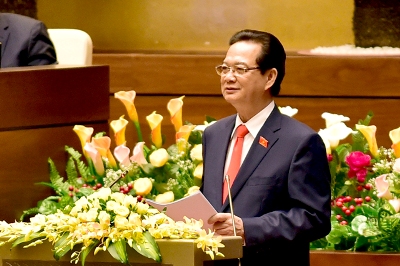PM: 13 out of 14 set criteria achieved
VGP – PM Nguyen Tan Dung announced that socio-economic performance has gained positive achievements in all fields at his report delivered at the National Assembly's 10th meeting on October 20.
Photo: VGP/Nhat Bac
Macro-economy stabilized

According to the report, the Consumer Price Index (CPI) sharply decreased from 18.13% in 2011 to 2% in 2015,the lowest in the past 15 years.
The export turnover increased around 18% per year and trade deficit reduced from 10.2% in 2011 to 3.67% in 2015.
Foreign reserves reached a record high. Total social investment saw 1.8 times higher than five years ago, accounting for 31.2% of the total GDP.
Total realized Foreign Direct Investment (FDI) and disbursed Official Development Assistance (ODA) achieved US$58.2 billion and US$24 billion, up 31% and 70.5%, respectively.
Reasonable growth rate
GDP growth in 2015 is estimated to obtain 6.5%, the highest recorded in the past five years and exceeding the set plan. Total GDP will reach US$204 billion, or a GDP per capita of US$2,228.
Industrial production is showing recovery, increasing around 10% at the end of 2015. The manufacturing and processing and agriculture sectors witnessed respective growths of 10.6% and 3.85%.
The density of the industry and service sector in the GDP rose from 79.42% in 2010 to 82.5% in 2015.
In the first nine months of 2015, the number of newly-established businesses increased 28.5%, registering a total capital rise of 31.4% against the same period last year. As many as 525,000 enterprises are operating, 1.5 times higher than that reported by the end of 2010.
Targets for the year achieved
PM Nguyen Tan Dung revealed that 13 out of the 14 set criteria have been achieved, driven by the performance in the first nine months of the year.
Eight criteria exceeding the targeted goals included the GDP growth rate (6.5%), the proportion of trade deficit compared to the total export turnover (3.6%), the CPI (up around 1.5-2.5%), the proportion of trained laborers among the total laborers (accounting for 51.6%), the proportion of malnourished children under five (14.1%), hospital beds per 10,000 people (24 beds), the proportion of treated environmental pollution plants (92%) and the proportion of industrial and processing zones with environmental standard waste management systems (84%).
Five criteria achieving the targets set for the year are the export turnover growth ( 10%), the total social investment compared to the GDP (30.5%), the creation of 1.6 million jobs, urban unemployment decline of 4% and the reduction of poor households (1.7-2%).
Only the criterion for forest recovery may not reach the target.
Five major lessons
The PM presented five major lessons drawn.
Firstly, it is necessary to strictly follow Party guidelines, the Constitution, and laws, making the national and people’s benefits first and foremost and focusing on completing the market economy and using effectively all resources for fast and sustainable development.
Secondly, the tasks and missions proposed must be suitable and approved by citizens. Difficulties and obstacles must be tackled and the responsibilities of State officials, especially the office heads, must be highlighted.
Thirdly, it is vital to ensure social security and improve people’s lives, develop rural agriculture, ethnic minority areas and disadvantaged regions and synchronously implement social equality and progress.
Fourthly, it needs to have active international integration, expand and diversify the market, attract and take advantage of outside resources and create a favorable environment for national industrialization and modernization.
Fifthly, PM Dung required to strengthen the bloc of the national unity, promote democracy, enhance the close cooperation among organizations in the political system and create social consensus.
By Thuy Dung

